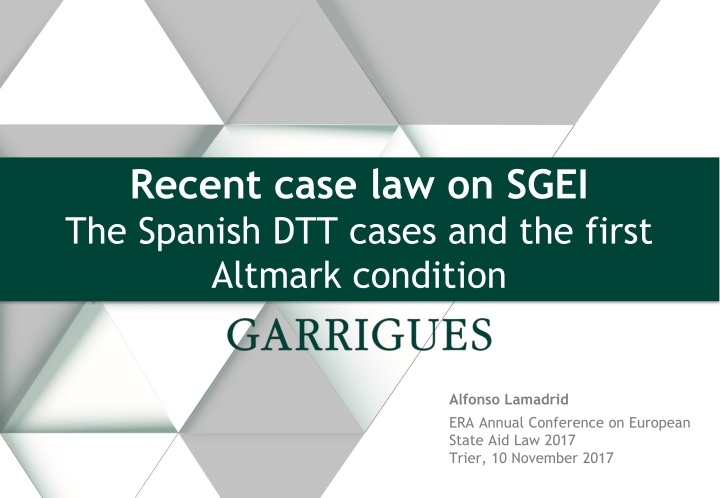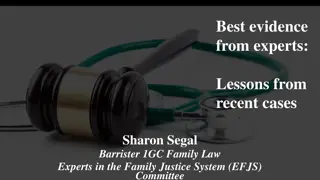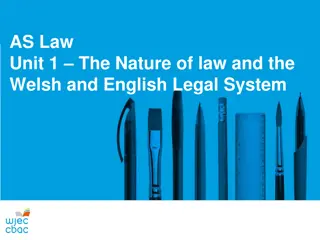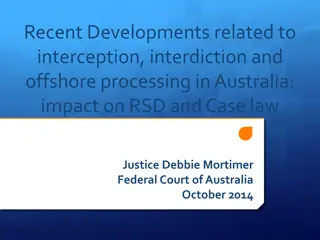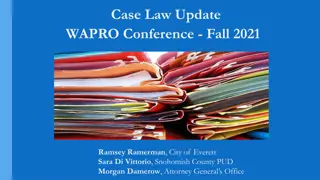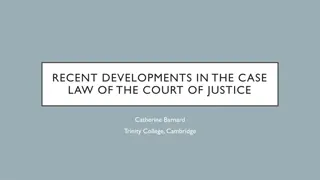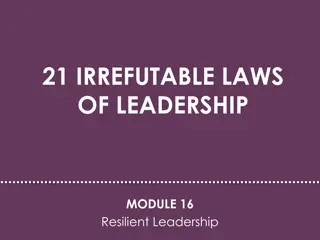Recent case law on SGEI
Discussion on the first Altmark condition, Protocol 26, Member States' discretion in defining SGEIs, and practical examples in Spanish DTT cases. Key considerations on defining services of general economic interest (SGEI) and legal implications.
Download Presentation

Please find below an Image/Link to download the presentation.
The content on the website is provided AS IS for your information and personal use only. It may not be sold, licensed, or shared on other websites without obtaining consent from the author.If you encounter any issues during the download, it is possible that the publisher has removed the file from their server.
You are allowed to download the files provided on this website for personal or commercial use, subject to the condition that they are used lawfully. All files are the property of their respective owners.
The content on the website is provided AS IS for your information and personal use only. It may not be sold, licensed, or shared on other websites without obtaining consent from the author.
E N D
Presentation Transcript
Recent case law on SGEI The Spanish DTT cases and the first Altmark condition Alfonso Lamadrid ERA Annual Conference on European State Aid Law 2017 Trier, 10 November 2017
CAUTIONARY NOTE UNLIKE MY TYPICAL PRESENTATIONS, THIS ONE FEATURES LOTS OF TEXT. THIS IS FOR YOU TO VERIFY I AM NOT MAKING IT UP, BUT RATHER DISCUSSING WHAT DECISIONS, JUDGMENTS AND OPINION ACTUALLY SAY. 2
The Theory (I) First Altmark condition: The recipient undertaking must actually have public service obligations to discharge, and those obligations must have been clearly defined (Altmark, 89) Protocol 26 to the Treaties: essential role and the wide discretion of national, regional and local authorities in providing, commissioning and organising services of general economic interest as closely as possible to the needs of the users P.J.L presentation from 2 ago: MS discretion in defining SGEI/PSO extends to (i) which failure to remedy; (ii) extent to which it should be remedied and (iii) how to remedy it 3
The Theory (II) Member States have wide discretion to define what they regard as an SGEI and, consequently, the definition of such services by a Member State can be questioned by the Commission only in the event of manifest error In order to be classified as an SGEI, the service in question must be of a general economic interest exhibiting special characteristics by comparison with the general economic interest of other economic activities The scope of the GC s review of the Commission s assessments ( ) must nevertheless ensure respect for certain minimum criteria relating, inter alia, to the presence of an act of the public authority entrusting the operators in question with an SGEI mission, and to the universal and compulsory nature of that mission 4
The Practice Example 1 5
The Practice Example 2 6
The Practice Example 3 7
Spanish DTT case The background Spanish measures aimed at compensating for the digitalization of preexisting analogical terrestrial TV network in remote and isolated areas of Spain (so-called Area II ); Area II covers 2,5% of Spanish territory not covered by universal service obligations imposed on broadcasters and on which the EC and the GC acknowledge a market failure (no TV in absence of public intervention; Decision 151-152) (Spanish Supreme Court had noted that the measures are undoubtedly in the public interest ) Most entrusted the service to in-house providers; Autonomous Communities called for public tenders, others A satellite operator complains to EC about breach of principle of technological neutrality. 8
Spanish DTT case EC Decision(s) No SGEI The decisions conclude that 1st Altmark condition is not met (paras 119-126 and 172): 119: Spanish law does not declare the operation of a terrestrial network to be a public service. The 1998 Telecommunications Law states that telecommunications services, including operation of networks supporting radio and television, are services of general economic interest but they do not have the status of public services, which are reserved only for a limited number of telecommunications services (underlining added) ?! 121: Although the law in force and applicable at the time ( ) defined public broadcasting as a public service, according to the Commission it is not possible to extend this definition to the operation of a particular supporting platform. Moreover, where several transmission platforms exist, one particular platform cannot be considered to be "essential" for the transmission of broadcasting signals. It would therefore have constituted a manifest error, if Spanish legislation had declared the use of a particular platform for the transmission of broadcasting signals to be a public service (underlining added) ?! 122: It is therefore concluded that under Spanish law the operation of terrestrial networks does not have the status of a public service 123: The Basque authorities argue that the assignment of the provision of this service of general economic interest to Itelazpi is explicitly contained [in the Conventions in with the Basque administration which] recognises that values such as universal access to information and plurality of information require the universalization of free-to-air television and undertakes to safeguard these values by extending the coverage of the state multiplexes. However, no provision of the Conventions actually suggests that the operation of terrestrial network is considered to be a public service 172: The Commission considers that the national (or regional) authorities have to define the SGEI clearly and entrust it to a particular undertaking. As assessed in paragraphs (119) to (122), it is considered that the Spanish and Basque authorities did not clearly define the operation of a terrestrial platform as a public service 9
Slide 7- Spanish DTT case- The legal issues 1) What is the meaning of clear definition under the first Altmark condition? In particular: Do MS have to clearly and formally define a given service as SGEI (or necessarily as a public service ? (Decision, 172) OR Do MS have to clearly define public service obligations that materially constitute a SGEI? E.g. Guide to the application of the European Union rules on state aid, public procurement and the internal market to services of general economic interest, and in particular to social services of general interest , section 2.2, EU law does not create any obligation to designate formally a task or a service as being of general economic interest, except when such obligation is laid out in Union legislation. If the content of an SGEI i.e. public service obligations is clearly identified, it is not necessary for the service in question to be designated 'SGEI'. See e.g. T-17/02, Fred Olsen, PARA. 201 Traditionally considered that public tenders complied with requirement of clearly identifying PSOs 2) Does the manifest error test also apply to MS competence to choose the means of providing the SGEI? Is it necessary that the definition of SGEI or the act of entrustment refer to specific means to providing the service? Is it even legal? On the one hand, principle technological neutrality. On the other hand, MS wide discretion in providing, commissioning and organizing . 10
Spanish DTT case GC Judgments (I. Reasoning) GC Judgments of 26 November 2015, Pa s Vasco and Itelazpi/EC (T-462/13, EU:T:2015:902), Catalu a and CTTI/EC (T-465/13, EU:T:2015:900), Navarra de Servicios y Tecnolog as/EC (T-487/13, EU:T:2015:899), Abertis Telecom and Retevisi n I/EC (T-541/13, EU:T:2015:898), Galicia and Retegal/EC (T- 463/13 y T-464/13, EU:T:2015:901), and Spain/EC (T-461/13, EU:T:2015:891) + GC Judgments of 15 December 2016 in Joined Cases T-37/15 and T- 39/15, Abertis Telecom Terrestre/EC and Telecom Castilla-La Mancha. State general principles (including excerpts in slide 2)- OK so far BUT consider definition not to be sufficiently clear : Even if market failure and references to SGEI in national law not put into question, legal designation not clear enough as it does not refer specifically to the exploitation of a DTT network/ in area II (GC limits assessment to Telecomm Acts cited in the decision, excluding Supreme Court Orders and other acts). The fact that a given service is designated as SGEI under national law does not imply all operators providing them have clearly defined PSO to discharge designates SGEI but does not set out PSO obligations) Analysis of Conventions and Tenders does not show that the exploitation of terrestrial network is defined as SGEI (= The obligations set out there in are not formally labeled as SGEI / SP ) However, GC considers that Decision (121) erred in holding that referring to a given technology in the definition would in any event have constituted a manifest error (not featured in Spain s Judgment, but yes in others; e.g. T-462/13, para. 78) As a rule, MS need to consider tech neutrality, but can choose specific platform if there are objective reasons unless manifest error . (= National law 11
Spanish DTT case GC Judgments (II. Conclusion) GC Judgments of 26 November 2015, Pa s Vasco and Itelazpi/EC (T-462/13, EU:T:2015:902), Catalu a and CTTI/EC (T-465/13, EU:T:2015:900), Navarra de Servicios y Tecnolog as/EC (T-487/13, EU:T:2015:899), Abertis Telecom and Retevisi n I/EC (T-541/13, EU:T:2015:898), Galicia and Retegal/EC (T- 463/13 y T-464/13, EU:T:2015:901), and Spain/EC (T-461/13, EU:T:2015:891) + GC Judgments of 15 December 2016 in Joined Cases T-37/15 and T- 39/15, Abertis Telecom Terrestre/EC and Telecom Castilla-La Mancha. In the light of the foregoing, although the Commission was wrong to consider that the definition of a particular platform for the operation of the broadcasting networks constituted a manifest error on the part of the Spanish authorities, the first criterion in the judgment in Altmark, was not satisfied in the absence of a clear and precise definition of the service at issue as a public service, as the Commission found in recitals 119 to 125 of the contested decision 12
Spanish DTT case The Appeals Pa s Vasco and Itelazpi, S.A. (C-66/16 P), Catalu a and CTTI (C-67/16 P), Navarra de Servicios y Tecnolog as, S.A. (C-68/16 P), Cellnex Telecom (C-69/16 P), Galicia and Retegal (C-70/16 P), Kingdom of Spain (C-81/16 P) + Cellnex Telecom (C-91/17 P) and Telecom CLM (C-92/17 P) First and only ground of appeal (6 sub-pleas) submits that the General Court erred in the judgment under appeal in that: i. It breached the manifest error standard of review; ii. it unduly restricted the Member States broad discretion , which applies both to the definition of the SGEI and the organisation of the SGEI and which thus includes the choice of the ways of performing the SGEI and the choice of a specific technology; [For some reason, only the two first sub-pleas are examined in AG s Opinion] i. its analysis of the applicable Spanish law was flawed (misrepresentation of facts- only some applicants as revealed by AG s Opinion); ii. it failed to recognise that the definition of the SGEI and the entrusting of the SGEI to one or several undertakings can be done by more than one act; iii. it failed to recognise that the definition of the SGEI and the entrusting do not require the use of a specific formula or wording, but a substantive and functional analysis; iv. it ignored the applicability of Protocol (No 29) on the system of public broadcasting in the Member States annexed to the TFEU and TEU. 13
Spanish DTT case AG Wathelets Opinion (I. General principles) 100-104 Acknowledges wide margin of discretion for MS to define SGEI, their scope and organization and that review limited to manifest error. BUT 110 Even if MS enjoy a wide margin of discretion to define SGEI, the first Altmark condition requires that the recipient undertaking must actually have public service obligations to discharge [ PSOs ], and the obligations must be clearly defined in order for such compensation to escape classification as State aid 111-112: Entrustment and definition of PSOs are clearly different from MS political prerogative to define services as SGEI = Strict review and up to MS to demonstrate. Standard is not manifest error but control of legality. 113-116: Minimum content of act of entrustment legislative (reglamentary or contractual act that, at minimum, defines nature, scope, and duration of the obligations at issue). 14
Spanish DTT case - AG Wathelets Opinion (II. In Casu) Applying these principles to case at issue, AG considers that: 121: Minimum requirements regarding PSOs unrelated to MS margin of discretion to define SGEI + 122 clarifies that market failures or the fact that obligation is ideally suited to be qualified as SGEI are irrelevant in this regard; only relevant to definition of SGEI. 126-127: Argument that GC ignored MS s margin of discretion to provide, commission and organize SGEIs by limiting discretion to technology included in definition constitutes a wrong reading of the Judgments . The GC did not question MS margin of discretion to choose a given technology, but rather only verified that Spain had not defined the operation of a terrestrial network as a public service in a sufficiently clear and precise manner in the sense of the first Altmark condition. 15
Spanish DTT case AG Wathelets Opinion (III. The open questions) The problem with the AG Opinion is that it does not get the issue: Does the first Altmark condition really require anything to be labelled as public service in a sufficiently clear and precise manner ? Wasn t it just about clearly setting out the PSOs? Everyone is talking about a different thing! EC (119 and 121) had concluded that designation as SGEI is not sufficiently clear because it did not refer explicitly to the terrestrial network (DTT); GC carries our separate analysis: (i) SGEI definition did not refer to DTT + obligations not defined + (ii) Tenders and Conventions do set out obligations and refer to DTT but don t formally label these as SGEI/PS. AG, bases Opinion on idea that the definition of SGEI and that of PSO are different and subject to different standards of review- But then endorses application of strict standard to review the definition of the SGEI (126- 127). GC considered that the definition of the PSOs was not clear because it did not refer explicitly to the terrestrial network . Applicants counter argue that there is no need to refer explicitly to one platform when defining PSOs. AG responds that GC did not limit MS margin of discretion to choose a given technology (?) AG Opinion observes (but only in the abstract) that SGEI and public service mean the same thing (fn. 58) and (ii) that GC did not limit MS s margin of discretion to choose a technology (126-127). Had the AG examined the Spanish law and entrustment acts he would have arguably arrived at different conclusion from EC and GC, but it does not. Opinion only deals with 2 out of 6 parts of plea (acknowledged in para. 34). 16
Conclusions If confirmed by CJEU, these cases will add two important developments: 1) That it is the SGEI/PS (as opposed to just public service obligations) that has to be defined; 2) That for a SGEI/PSO definition to be valid it must (?) make reference to the technology to be used; Conflicting views and lack of clarity as to 1st Altmark condition results in discretion for EC and uncertainty for MS; Impact on other SGEIs in other MS? 17
